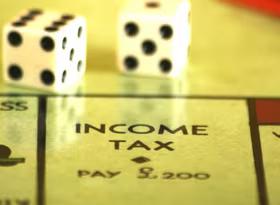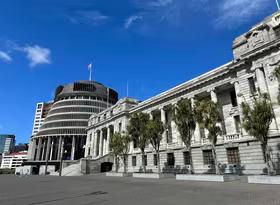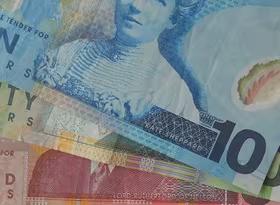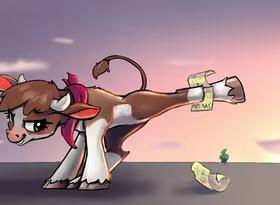More credibilty at homeowners’ expense
More credibility at homeowners’ expense
Alan Bollard’s recent reappointment as governor of the Reserve Bank for another five years saw Michael Cullen lauding "his integrity and outstanding general management skills". Those qualities may not be in question, but in terms of actually doing his job and keeping a credible rein on inflation, Dr Bollard’s results have been unimpressive. Nevertheless, this year’s interest rate rises have shown a steelier side to the Reserve Bank governor, and imply little hope of relief for mortgage holders in the foreseeable future.
As governor of the Reserve Bank, Dr Bollard has been charged with keeping inflation between 1% and 3%pa for the last 18 quarters. Simply running one’s eyes over the numbers shows that there have been five quarters where he’s failed to achieve his target, giving him a 62% success rate. In contrast, if we look at Don Brash’s efforts between 1993 and 2002, he hit the bull’s eye 78% of the time. And Dr Brash had a more difficult target to aim at, down at 0-2%pa for the early part of his reign.
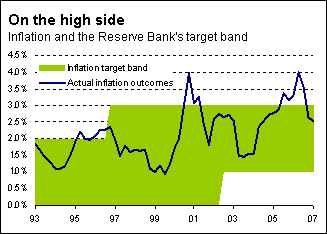
Graph 1
Supporters of Dr Bollard will be quick to suggest that he’s been a victim of circumstance. After all, it’s virtually impossible for anyone in little old New Zealand to prevent the 42% surge in petrol prices that occurred over a 15-month period in 2005/06. In this situation, the Reserve Bank’s role then becomes one of containing the public’s expectations of future inflation.
This area is where Alan Bollard’s performance is most disappointing. Over the last 4 ½ years, the Bank’s own forecasts of inflation two years down the track have averaged 2.6%pa — not much below the ceiling of the Bank’s 0-3% target. Even last week’s Monetary Policy Statement showed that the Bank expects inflation still to be at 2.8% by mid-2009.
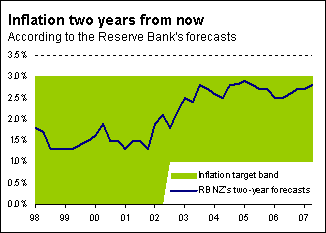
Graph 2
If the organisation charged with keeping inflation under control is so unconvinced about its own effectiveness, why should the general public believe that price stability is a given? The figures are even starker when compared with the Bank’s two-year inflation forecasts between 1997 and 2002. With an average forecast of 1.5%pa, Don Brash had his sights firmly on the mid-point of the inflation target band.
Domestic inflation has been Dr Bollard’s bugbear. However, he’s been so scared of destroying the export sector with the strong currency over the last four years that he’s almost felt obliged to let inflation pressures build more than they should have. He now appears to have decided to ignore any squeals of pain from exporters and focus on his core job of ensuring price stability.
Alan Bollard’s reappointment follows two years virtually learning on the job and another two years working up the courage to dictate to, rather than follow the lead of, financial markets. His next five-year term provides him the opportunity to atone for the mistakes of the last five years, when his approach to setting monetary policy has too often erred towards the "softly, softly" end of the spectrum.
Getting the public’s inflation expectations back down will require an extended period of high interest rates. Even if economic conditions are right for the official cash rate to be cut by the end of next year, which is by no means a given, mortgage holders shouldn’t be hoping for much of an easing. An OCR of 7% (or floating mortgage rates of 9%) may be all the pain relief the Doctor can administer.
The economy will suffer consequences of Alan Bollard’s learning curve. Demand conditions will be cramped by high interest rates, economic growth will remain below par, and some rise in unemployment seems inevitable. Profit margins have been heavily squeezed over the last two years, but there will be little opportunity for businesses to improve their profitability given the tough trading conditions now upon us.
The positive aspect of Dr Bollard’s reappointment is that he is in a position to rectify his past mistakes. Hopefully he will repay this faith by coaxing the inflation genie back into its bottle, thus laying the foundations for a stronger economic performance further down the track.
